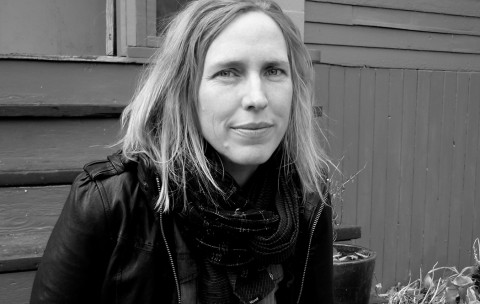Talking with Miriam Toews about Women Talking
“My novel is just one small part of a conversation that can’t be silenced.”

Miriam Toews grew up in a Mennonite community in Manitoba, Canada. Her novels include A Complicated Kindness, All My Puny Sorrows, and Irma Voth, and she played a leading role in the 2007 film Silent Light. Her new novel, Women Talking, imagines the aftermath of a real-life event: the ongoing, systematic rapes of girls and women in a Mennonite colony in Bolivia that were perpetrated and covered up by the men of the community.
What do you see as the benefits of growing up in a small, close-knit community? What messages about God, humanity, and the world did your town’s Mennonite identity instill in you?
I had a great childhood. I roamed freely all around the town. Everyone knew who my parents were, who my grandparents were, and where I lived. There was a certain comfort in that, at least when I was a kid.
Read our latest issue or browse back issues.
With respect to Mennonite teachings, I appreciate the ideas behind adult baptism: willing and conscious acceptance of Jesus and purifying oneself of pride. Mennonites also emphasize loyalty and community. They do a lot of good work to help the needy and, of course, to promote peace and pacifism.
Why did you leave the Mennonites? What aspects of that tradition were most harmful?
Actually, it was one of my uncles who removed me from church membership. That said, I didn’t rejoin. But I am and always will be a Mennonite.
What is harmful in the Mennonite tradition resembles what’s harmful in any religion—when religious leaders use the authority of God to scold, shame, punish, silence, and shun people. In extreme cases, they use God’s authority to justify the most depraved crimes. It’s that abuse of authority—and witnessing first hand its destructive effects—that alienated me from the church.
Do you think a separatist religious community can ever be free of the dangers associated with insularity?
A community that seeks isolation from the world is more likely to operate within a closed system of thought, one that doesn’t leave much space for critical thinking. If you want to get along, you have to submit and obey. I think the inquiring individual in such a community is always in danger of subjugation and indignity. But any community, however insular, can improve itself and evolve to become more equitable, forgiving, and tolerant.
Most of Women Talking consists of dialogue between women, as recorded by a man, August Epp. How did you negotiate the complexities of being a woman writing about a man who’s writing about women talking about men?
I can’t say I had any trouble entering into August’s mindset and perspective as a man. He resembles, in many ways, my father, who was a gentle, curious, tormented, somewhat formal man, hugely in love with my fierce mother. August is in love with the fierce Ona. As we discover, Ona has given August his note-taking task out of compassion and concern for him.
I needed August in order to tell the story. The women are illiterate. He becomes a perfect guide into an exotic, closed world—he knows that world, but he has lived outside of it and was educated in London. I also like the fact that, symbolically—with the women carrying on a kind of Socratic dialogue and August in a subordinate, secretarial role—it’s an inversion of the traditional dynamic between men and women.
Early in the novel, August tells a story from his childhood about stealing fruit from a pear tree and confessing to his mother, Monica—clear references to Augustine’s Confessions. What do the Confessions evoke in you that you wanted to add to August’s character?
August’s deep and ongoing self-recrimination evokes Augustine. What becomes apparent for August, and for the women of Molotschna, is that our actions are born of what we believe. There’s no such thing as a purely practical decision. Behind each decision is a layering of premise, presumption, and desire.
The women of Molotschna discuss the forms of freedom they seek—freedom to keep their children safe, freedom to keep their faith, and freedom to think. Since it’s not clear that they’ll ever achieve such freedom, what might justice look like for these women?
We have to define the freedoms we seek. We have to hold them up in front of us so that we can go toward them. For the women of Molotschna, it’s not obvious how they’ll win their freedom. Each of their three options—do nothing, fight, leave—represents terrible sacrifice and loss; each option promises only partial and compromised freedom. Unfortunately, for these women, justice, if it comes at all, will also turn out to be partial and compromised.
Your characters sometimes use humor to deal with difficult topics. In what ways have you found humor to be useful as a response to trauma?
I don’t think of humor as a remedy to be taken during hard times. Humor happens, naturally and spontaneously, in the most heartbreaking circumstances. It’s just how it is. We laugh out of sorrow and cry out of happiness. Tragedy and triviality inhabit the very same moment. In writing about the saddest things, humor floods into the prose. But it’s very difficult to find the exact source of it, or to say how and why it happens.
Can you reflect on what it means for you—a woman who has a career and formal education, lives in a city, and isn’t bound to a church—to imagine the lives of women who are immersed in an isolated patriarchal religious context?
There are a few “authorities” in the Mennonite community who’ve tried to discredit me by suggesting I am too removed to have any insight into the life and mindset of the colony. Not because they have the welfare of the women in mind, but because they want to draw attention away from these awful crimes, to protect the reputation of Mennonites, and to uphold the patriarchs who were and continue to be complicit in the repression of women.
But my novel is just one small part of a conversation that can’t be silenced. A few committed Mennonites, religious and nonreligious, are working hard to bring this story into the open, to understand how these rapes could have happened, and to advocate for the victims of sexual violence and incest. There’s no reason Mennonites should be any less capable of critical self-reflection than any other cultural group.
Would you want the women of the actual Manitoba Colony to read Women Talking? Would you want the men of the colony to read it?
I’d be very happy for the women of the colony to read my book, for them to know that there are other Mennonites out there who stand in solidarity with them and who feel deep compassion for them. I’d hope it would make them feel less alone and, who knows, maybe even empowered. I’d hope that if the men read this book, they would be compelled to reflect on why these crimes happened and to think about what they could do personally to both protect and unfetter the women they live with.
One major theme in the book is the question of when to stay in a less-than-ideal religious community, when to leave it, and whether to return. Do you have any wisdom about how to begin answering such a complex question?
As you say, this is not a simple issue. I’d say: be as brave as you can be, stand by your convictions, let your voice be heard. You might be surprised how many in your religious community share your point of view. On the other hand, you may discover that you’re among the wrong kind of people, and you have no choice but to leave.
In Women Talking, my characters, although they consider leaving their community, are never talking about leaving their faith. Whatever decision they make, they make within the framework of their faith.
Read Valerie Weaver-Zercher's review of Women Talking.
A version of this article appears in the print edition under the title “A Mennonite story: Novelist Miriam Toews.”






